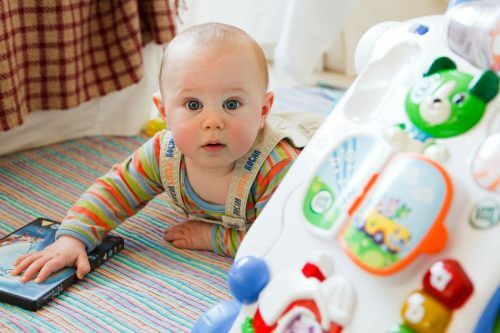Adults and infants probably use the same mechanism to improve their movement accuracy

If older people make excessive movements, it may actually help improve their control over their movements. This is according to a new study at Ben-Gurion University, according to which it is possible that a movement control mechanism, which until now was linked to the early stages of development of babies and toddlers, also works in older people. In early stages of development, babies make seemingly random movements in all directions, until they learn to reach for objects in a purposeful way. Their movements are very varied until they find the appropriate movement for the task in front of them (for example, being able to grab the cornflakes and put it in their mouths). This mechanism is called "exploration-exploitation": they explore the range of possibilities, and when they find a suitable movement, they exploit it.
In an article published these days in the journal Scientific Reports (from group Nature), Dr. Sheli Levy-Tzedek, Head The Laboratory for Aging Research, Cognition and Rehabilitation In the Department of Physiotherapy in the Faculty of Health Sciences at the university and a company in the initiative ABC Robotics וat the Zlotovsky Center for Neuroscience, together with her team, showed that the same exploration-exploitation mechanism also works among older people.
In their experiment, older people made movements in an attempt to stay focused on a target, but without much success. "Their movements were too slow and too small. After we asked them to make bigger and faster movements, their performance in the original task improved significantly," says Levy-Tzedek.
Although the new mechanism has not yet been tested in the context of physical therapy, Levi-Zedek believes that it holds promise for the future. "We haven't tested it directly yet, but it's possible that if older people make excessive movements, it will help them perform better certain tasks that would otherwise be difficult to perform," she says.
The researchers were surprised to find that "mistakes" in movement actually help improve future performance. Also, they were surprised to find that once a better mode of movement was chosen, the variety was reduced. This led them to the conclusion that the variety of movements plays a role in finding a more successful movement plan.
The research was funded by the Brandeis Lair and Bronfman Foundation; "Promobilia" Foundation; The Israel Science Foundation and the Helmsley Foundation, through the Center for Agricultural, Biological and Cognitive Robotics at Ben-Gurion University of the Negev.

One response
So it was clear what the article meant.
But in my opinion, there is a refresh here for the wisdom that was discovered already thousands of years ago in the Far East - tai-chi, qigong, falon data, yoga, karate, and the other ancient martial arts... the one who practices them gets the ability to concentrate and the benefits of coordination and control over his body and mind.